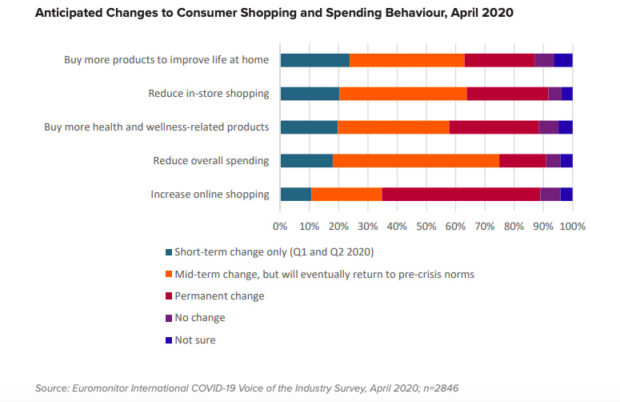
In light of the COVID-19 pandemic, these three are some of the top priorities of business leaders across the world, according to the report “2020 Industry Insights,” published recently by global market research firm Euromonitor International.
Authored by Lisa Holmes, Euromonitor’s head of global surveys, the report contains results of the firm’s “Voice of the Industry” survey series, plus findings of “Voice of the Industry: COVID-19 Survey,” which was fielded in April 2020 among almost 5,000 professionals working from all over the world.
The regular survey series, which rotate across 12 key industries (alcoholic drinks, beauty and personal care, consumer food service, consumer health, digital consumer, home care, luxury, nonalcoholic drinks, packaged food, retailing, sustainability and travel) annually, focus on professionals’ insights on three “pillars” of company culture: customer culture, digital culture and sustainability culture. Sample sizes of respondents from each industry range from 250 to over 1,000.
When it comes to customer culture, Euromonitor reports that COVID-19 has “accelerated shopper trends that were already in motion surrounding seamless checkout and fulfillment,” both online and in-store. Based on results of the “Voice of the Industry: COVID-19 Survey,” more consumers are anticipated to increase their online shopping permanently, and that “omnichannel solutions” (hyperlocal delivery, click and collect), will be minimum requirements for brands and businesses.
It’s a good thing, then, the “Voice of the Industry” results in 2018 and 2019 consistently show that “improving the customer journey and experience” has been identified by many respondents (59 percent) as the most important factor of business development, with technology being the key enabler.
“Brands can use technology to deliver a truly curated experience for the consumer, catering to individual preferences, beliefs and lifestyles for absolute consumer-centricity,” the report reads.
This means, Euromonitor adds, that consistent and seamless service should be provided by companies across all their sales channels/platforms, both digital and physical.
And because consumers are now more adept in using digital technology, it only follows that customer service should also be done via such channels, such as email, call centers, social media, SMS and online chats—which means a company also needs to have a strong digital culture, the report reads.
COVID-19 has already accelerated digital transformation for many; according to the “Voice of the Industry: COVID-19 Survey,” almost 70 percent of respondents say they have expanded remote working, while around 60 percent have reshaped and implemented digital strategies.
But to operate efficiently in a digital world, Euromonitor’s study finds that companies need to do more than just implement tech tools. Those who are experiencing difficulty in their digital transformation report these top issues: lack of required tech talent/skills (40 percent), cultural/behavioral challenges (40 percent), inadequate information technology infrastructure (over 30 percent), and lack of a corporate vision for digital (over 30 percent).
As for sustainability, the Euromonitor report says that business leaders’ understanding of this has evolved because of the pandemic—aside from addressing environmental concerns, sustainability, for companies, now includes setting goals that create both social economic value.
This makes “purposeful leadership” more important now, says Euromonitor, adding that companies are “expected to lead with transparency and empathy, aligning their actions with their promises.”
Ultimately, and regardless of industry, Euromonitor states that “technological advancements, new digitally native brands and changing consumer expectations are driving uncertainty and increased competition. By understanding what cross-industry peers are focusing on for future investments and long-term strategies, businesses can stay ahead of change, embrace new opportunities to improve the customer experience and meet sustainability goals to maintain their competitive edge.” INQ